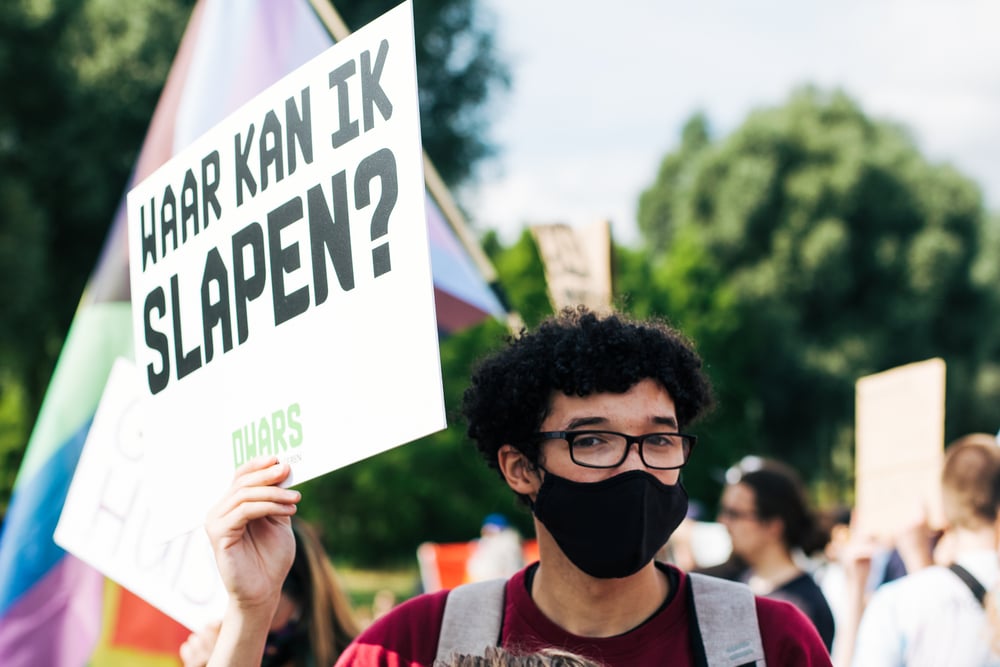As any room-hunting student knows, the Dutch housing market has its own vocabulary. It comprises lots of phrases, some quite obscure, such as “excl. G/W/E”, and others painfully clear — such as “no internationals”.
As the years go by and the student housing crisis rages on, discrimination against international students remains a big problem in the Netherlands, reports the Volkskrant.
How bad is it?
Around two-thirds of the Facebook ads for student housing in the Netherlands explicitly exclude internationals, David Bekkering of reporting centre Discriminatie.nl tells the Volkskrant.
This is “inhospitable, rude and xenophobic,” says Bekkering — and yet, it keeps happening. And what’s worse is, the discrimination is mostly enacted by fellow students.
The housing crisis rages on
This situation is part of a larger problem, the Dutch student housing crisis.

The demand for student housing keeps rising, mostly due to the fact that the number of students in the Netherlands is also steadily increasing.
READ MORE | 11 creative solutions to the Dutch student housing crisis that makes us say “Why didn’t we think of that?”
More and more Dutch people are entering higher education, but the number of international students is also growing. Currently, international students total around 128,000, and that figure is expected to keep growing by 3.2% every year.
The housing market, however, struggles to keep up: last year there was a shortage of around 23,000 houses.
“Dutch only”
With such a severe shortage, students who post ads looking for roommates are immediately flooded by dozens of messages — inevitably, this leads to a heavy selection criteria.
This often means internationals, especially the ones who don’t speak Dutch, are the first category to be excluded.
READ MORE | ‘No internationals’: A tale of exclusion in the Dutch housing market
Dutch students who operate this selection usually cite language as their motive: they’re not afraid of cultural differences. and are fluent in English. However, for the sake of the house’s harmony, they don’t want to speak it at home.
While this is understandable on a case-to-case basis, when it becomes a larger phenomenon, it turns into systematic discrimination — cue the thousands of “DUTCH ONLY” disclaimers at the top of Facebook ads.
Is it even legal?
You might wonder if this kind of discrimination is legal. Well… it’s a grey area.

Legally, a landlord can’t really exclude people based on nationality. Landlords are subjected to all kinds of laws, as also recently reinforced by the 2023 “Good Landlord Act“.
READ MORE | Dutch Quirk #130: Charge hundreds of euros to live in a broom closet
However, the selection of new tenants is often not the landlord’s decision: usually, it is up to the current tenants to choose a new roommate. And this choice, in turn, is not bound by formal regulations.
So, what’s the solution?
Legally, this issue is a headache.
While services like Discriminatie.nl exist, several legal loopholes apply to this particular form of discrimination.
Even worse? Very few internationals even know about these services or try to reach out.
As for the government, the main approach so far has been to try and reduce the number of international students, for instance, by cutting down on English-taught programmes.
Whether this will work, or even be beneficial to the country, remains to be seen.
Have you been affected by the Dutch student housing crisis? Tell us about your experience in the comments below.




The article doesn’t actually answer the question. It does not comment further on the law or lack there of of further laws addressing discrimination. Instead, it ends up in a speculation. What is the point of writing an article if no information or commentary is provided?
I have to go nederland in d beginning of next year. We dont get any house at all. I’ve even tried to use dutch language to persuade landlord. But still dont have any result at all.
Interesting article. I am Scottish, based in Glasgow. With three unis, we have thousands of students. We definitely would not be allowed to say Scottish or British only. It would be illegal. The grouse most frequently heard here is that there are too many student flats being built and a lot of them are only affordable to wealthy overseas students or home students with rich parents. Most ‘normal’ students are at the mercy of lprivate landlords charging high rents for poor quality accommodation that they fail to maintain properly.